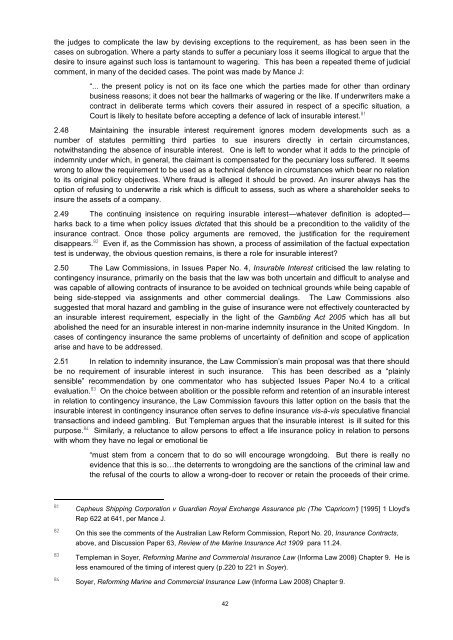Insurance Contracts CP - Law Reform Commission
Insurance Contracts CP - Law Reform Commission
Insurance Contracts CP - Law Reform Commission
You also want an ePaper? Increase the reach of your titles
YUMPU automatically turns print PDFs into web optimized ePapers that Google loves.
the judges to complicate the law by devising exceptions to the requirement, as has been seen in the<br />
cases on subrogation. Where a party stands to suffer a pecuniary loss it seems illogical to argue that the<br />
desire to insure against such loss is tantamount to wagering. This has been a repeated theme of judicial<br />
comment, in many of the decided cases. The point was made by Mance J:<br />
―... the present policy is not on its face one which the parties made for other than ordinary<br />
business reasons; it does not bear the hallmarks of wagering or the like. If underwriters make a<br />
contract in deliberate terms which covers their assured in respect of a specific situation, a<br />
Court is likely to hesitate before accepting a defence of lack of insurable interest. 81<br />
2.48 Maintaining the insurable interest requirement ignores modern developments such as a<br />
number of statutes permitting third parties to sue insurers directly in certain circumstances,<br />
notwithstanding the absence of insurable interest. One is left to wonder what it adds to the principle of<br />
indemnity under which, in general, the claimant is compensated for the pecuniary loss suffered. It seems<br />
wrong to allow the requirement to be used as a technical defence in circumstances which bear no relation<br />
to its original policy objectives. Where fraud is alleged it should be proved. An insurer always has the<br />
option of refusing to underwrite a risk which is difficult to assess, such as where a shareholder seeks to<br />
insure the assets of a company.<br />
2.49 The continuing insistence on requiring insurable interest—whatever definition is adopted—<br />
harks back to a time when policy issues dictated that this should be a precondition to the validity of the<br />
insurance contract. Once those policy arguments are removed, the justification for the requirement<br />
disappears. 82 Even if, as the <strong>Commission</strong> has shown, a process of assimilation of the factual expectation<br />
test is underway, the obvious question remains, is there a role for insurable interest?<br />
2.50 The <strong>Law</strong> <strong>Commission</strong>s, in Issues Paper No. 4, Insurable Interest criticised the law relating to<br />
contingency insurance, primarily on the basis that the law was both uncertain and difficult to analyse and<br />
was capable of allowing contracts of insurance to be avoided on technical grounds while being capable of<br />
being side-stepped via assignments and other commercial dealings. The <strong>Law</strong> <strong>Commission</strong>s also<br />
suggested that moral hazard and gambling in the guise of insurance were not effectively counteracted by<br />
an insurable interest requirement, especially in the light of the Gambling Act 2005 which has all but<br />
abolished the need for an insurable interest in non-marine indemnity insurance in the United Kingdom. In<br />
cases of contingency insurance the same problems of uncertainty of definition and scope of application<br />
arise and have to be addressed.<br />
2.51 In relation to indemnity insurance, the <strong>Law</strong> <strong>Commission</strong>‘s main proposal was that there should<br />
be no requirement of insurable interest in such insurance. This has been described as a ―plainly<br />
sensible‖ recommendation by one commentator who has subjected Issues Paper No.4 to a critical<br />
evaluation. 83 On the choice between abolition or the possible reform and retention of an insurable interest<br />
in relation to contingency insurance, the <strong>Law</strong> <strong>Commission</strong> favours this latter option on the basis that the<br />
insurable interest in contingency insurance often serves to define insurance vis-à-vis speculative financial<br />
transactions and indeed gambling. But Templeman argues that the insurable interest is ill suited for this<br />
purpose. 84 Similarly, a reluctance to allow persons to effect a life insurance policy in relation to persons<br />
with whom they have no legal or emotional tie<br />
―must stem from a concern that to do so will encourage wrongdoing. But there is really no<br />
evidence that this is so…the deterrents to wrongdoing are the sanctions of the criminal law and<br />
the refusal of the courts to allow a wrong-doer to recover or retain the proceeds of their crime.<br />
81<br />
82<br />
83<br />
84<br />
Cepheus Shipping Corporation v Guardian Royal Exchange Assurance plc (The 'Capricorn') [1995] 1 Lloyd's<br />
Rep 622 at 641, per Mance J.<br />
On this see the comments of the Australian <strong>Law</strong> <strong>Reform</strong> <strong>Commission</strong>, Report No. 20, <strong>Insurance</strong> <strong>Contracts</strong>,<br />
above, and Discussion Paper 63, Review of the Marine <strong>Insurance</strong> Act 1909 para 11.24.<br />
Templeman in Soyer, <strong>Reform</strong>ing Marine and Commercial <strong>Insurance</strong> <strong>Law</strong> (Informa <strong>Law</strong> 2008) Chapter 9. He is<br />
less enamoured of the timing of interest query (p.220 to 221 in Soyer).<br />
Soyer, <strong>Reform</strong>ing Marine and Commercial <strong>Insurance</strong> <strong>Law</strong> (Informa <strong>Law</strong> 2008) Chapter 9.<br />
42

















